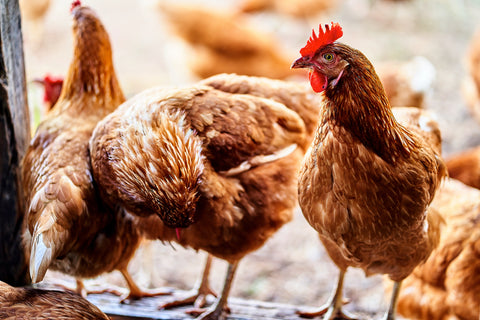There are a number of common health challenges that can affect backyard chickens. Like all animals, hens have their health issues. Some may come from other animals such as wild birds, rodents and predators while others come from parasitic insects such as lice, mites and worms. Knowing how to prevent and limit risks to your flock’s health will make owning chickens a much more enjoyable experience. Here’s the video of the event for those that prefer watching to reading: Chicken Health.
Viruses
There are 3 main viral diseases (among many others) that have the potential to affect backyard chickens. Two are respiratory diseases Avian infectious bronchitis (IB), and Infectious laryngotracheitis (ILT), and one tends to affect the nervous system of hens Marek’s Disease Virus (MDV).
Common signs of viral infection include:
- Clear discharge from the chicken’s nostrils
- Sneezing
- A raspiness or rattling sound to their breathing
- Gasping and stretching out their necks
- Reduction in egg-laying
- Drop in egg size, irregularly shaped eggs, or soft egg shells
- Paralysis of the legs, neck, or wings (Common with MDV)
- Poor vision
- Weight loss
Infectious bronchitis
Infectious bronchitis doesn’t normally kill older hens, but mortality can be high for chicks under about 5 weeks of age. Most layer hens, such as our
Hens will normally recover from the virus within 3 to 4 weeks but if one of your hens catches it, they will normally all get IB. There are no treatments available for infected hens and you’ll need to keep a watchful eye out for any secondary infections that are common in hens affected by IB. These infections, if bacterial, may require an antibiotic to treat.
Infectious laryngotracheitis
Infectious laryngotracheitis shares many similarities with the IB virus and its symptoms but tends to have a higher mortality rate. Our Hy-Line Browns are also vaccinated for ILT but again, there are many different strains that can still cause problems if hens become infected.
Hens that recover from ILT will be carriers for life so be aware of this when thinking of introducing new hens into your flock. Like IB, the virus is quite fragile and can be killed by disinfectants, heat, and direct sunlight when present in your hen’s environment. However, ILT can survive for up to 2 months in bedding and nesting materials if not dealt with effectively.
Marek’s Disease
Marek’s Disease is one of the world’s most common chicken diseases. It cannot be treated if a chicken becomes infected and chickens that contract the disease will become carriers for life, able to infect other chickens. However, the symptoms and spreading of MDV can be greatly reduced if chickens have been vaccinated. Some typical symptoms of MDV are paralysis of the wings, legs and neck.
Similar to the other viruses, Marek’s will often suppress the immune system of a chicken. This increases the chances of the affected hen picking up another, secondary disease. MDV is largely spread by feather dander from infected chickens which are then inhaled.
Bacterial infections
Salmonella is a type of bacteria that can live in the gut of animals including birds and rodents. The most common serovar in Victoria is Typhimurium which is responsible for most cases of Salmonellosis (the sickness that you get from infection). A more recent serovar that appeared in Victoria a few years ago was Salmonella Enteritidis, which enters the egg prior to the egg shell forming (vertical transmission).
Other types of bacterial infections include E. coli and Campylobacter which are a type of bacteria that can live in the gut of animals including birds and rodents. Cooking eggs thoroughly by baking, boiling, or frying etc. above 70 degrees Celcius will kill the vast majority of bacteria that may be present in or on eggs.
External parasites
External parasites, including poultry lice and mites, have been quite prevalent over the past 18 months for our customers in Melbourne. Poultry lice, in particular, are very common and get very jumpy in the heat as they find it difficult to control their body temperature. Lice are small, straw-coloured insects that eat the feather dander and dead skin cells of the hen. When they grow in number, they can cause a lot of stress to the bird who will be constantly preening in an attempt to rid herself of them.
Mites, on the other hand, can sometimes be seen on your hens’ eggs or inside your coop as they like to live in the nooks and crannies of a wooden coop. Mites are tiny brown, red, or black eight-legged “dots” and can start biting from the day they hatch. They tend to be nocturnal so are more easily detected at night time when they come out to feed on your hen’s blood and lay their eggs.
Because they pierce the skin of chickens to feed (like mosquitos), secondary infections can easily take hold to cause illness in hens.
Internal parasites
Internal parasites take the form of worms with the most common being roundworm (Ascaridia galli), which cause issues such as runny bottoms, soft and misshapen egg shells, poor physical condition, and weight loss. There are other types of parasitic worms such as thread, tape and gapeworm, but they are far less common.
Deworming should be done every 6 months to a year and make sure that you use a dewormer that doesn’t require eggs to be discarded during treatment. You will need to sweeten up the water-based dewormers as hens hate the taste but there is no such problem with feed-based dewormers.
Always follow up the first deworming with a second, 10 to 14 days later for best results.
Stopping disease and parasite activity
As mentioned in our June and July presentations, keeping hens warm, dry, and comfortable in their chicken coop will go a long way in reducing the number and size of any problems or issues that might come your way. This means a fully enclosed coop and run with narrow diameter mesh that will stop mice and small birds from entering.
Waterproof your run where possible as a dry, clean environment supports hen health. A deep (100mm) layer of
A good tread-on feeder is a great way to stop pests from being attracted to your chicken feed. Our locally made Chooktred feeder is very effective in keeping pests away from your chicken feed and chickens. Create a dust bath to reduce parasites by using a shallow, plastic or metal dish and place a combination of shavings, dirt, wood ash and Diatomaceous Earth in it (found in our
Housekeeping
Clean your coop regularly and perform a deep-clean at least twice each year. Scrape-off all deposits of manure then remove all bedding, nesting, feathers and dirt. Spray all surfaces with a detergent then wash clean and allow time to dry. Finish by spraying all surfaces with a good sanitiser and placing fresh bedding and nesting materials into the coop with a liberal sprinkle of
It’s best to temporarily rehome your hens in another shed or structure at your property while deep cleaning but make sure they are safe from foxes at night. It’s a great idea to give your flock a daily, heightened dose of nutrition when any member is suffering or has suffered from any disease or stress event. Vitality Booster can be mixed in with drinking water or sprayed directly onto chicken feed to boost their energy and support their immune system.
Wounds
Trauma injuries caused by pecking from other hens or attacks from predators need special treatment. The first thing to do is to remove and isolate the injured hen from the others as they will tend to peck at the injury. If the wounds aren’t too bad, you can spray the affected area with an antibacterial wound spray such as Cetrigen. You will need to discard any eggs laid by the injured hen until at least 14-days following the last treatment.
Contamination
Be aware of what is on your property or what might have been on it. Older homes have been shown to have heightened levels of lead in the soil and possibly other contaminants. This lead has come from the discarding of lead-based petrol and paint products banned in the 70’s. If your home is older and near a city centre, it can be a good idea to have your soil tested if you have backyard chickens, bees, vegetables or children.
Finally, buy vaccinated hens if at all possible as many of the nasty results of viruses and diseases can be avoided if chickens are vaccinated. Unfortunately, most purebred chickens aren’t vaccinated as a rule, but always ask for details of any vaccinations claimed to have been given. Without vaccinated hens, you will need to be extremely vigilant with your biosecurity practices and have some good luck as well.
When it comes to raising backyard chickens, it's important to be aware of the health challenges they may face and how to prevent them. From viral and bacterial infections to external and internal parasites, there are various risks that can affect your flock. Vaccinations, proper housing, and good hygiene practices are all crucial for maintaining healthy chickens. Using natural pest control products like






Comments (2)
Hello
I purchased my silkie rooster at a poultry auction and he was in a poor condition but my other two chickens are in good health and he isn’t. I feed him well and he has a very clean coop. He has pellets, sardines, spaghetti, corn and boiled pumpkin once a week. So do the others.
His feathers are old and won’t grow back and his feet are very scaly. What do I do? He’s a lovely natured boy who sits on my shoulder when I walk around.
Does anyone have any tips?
I have a hen that is not eating or moving around well, what is wrong